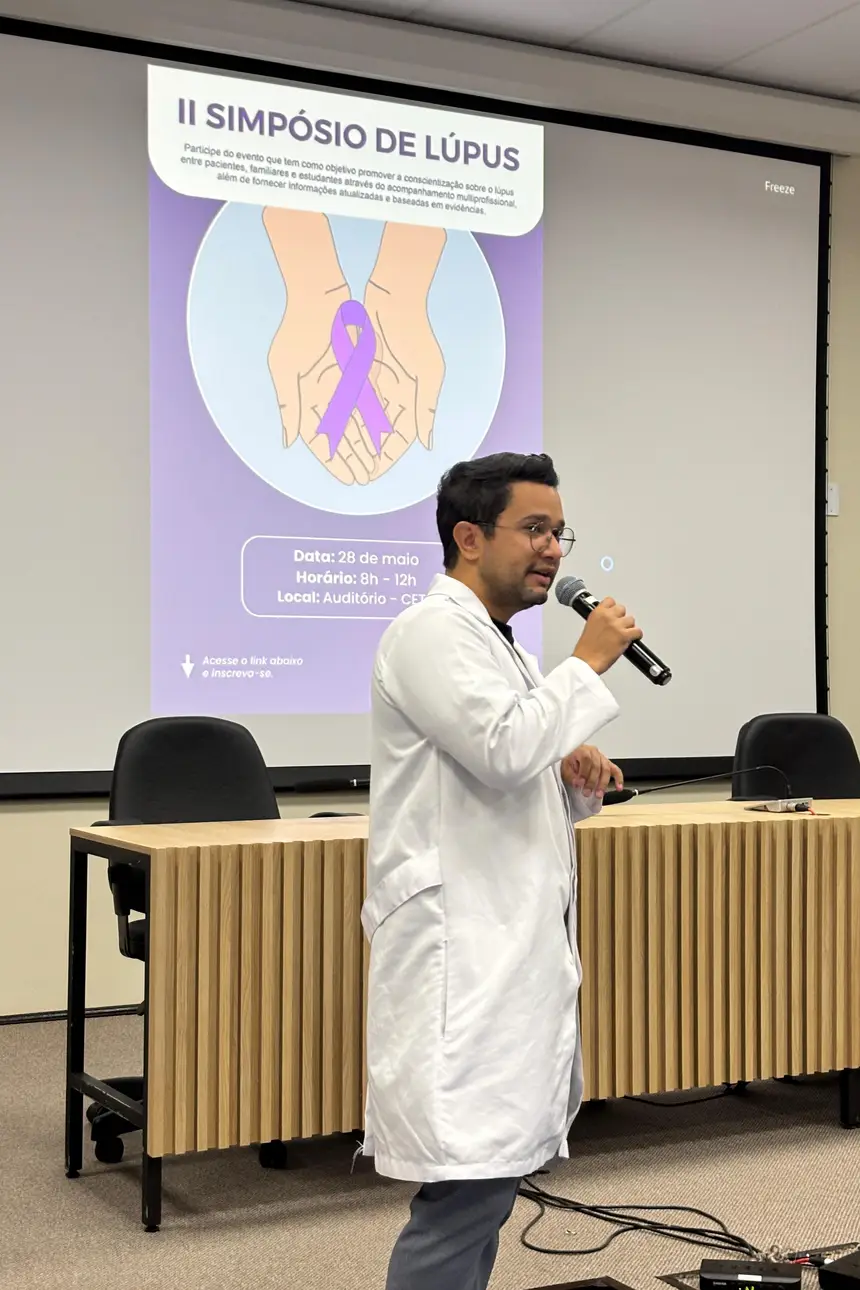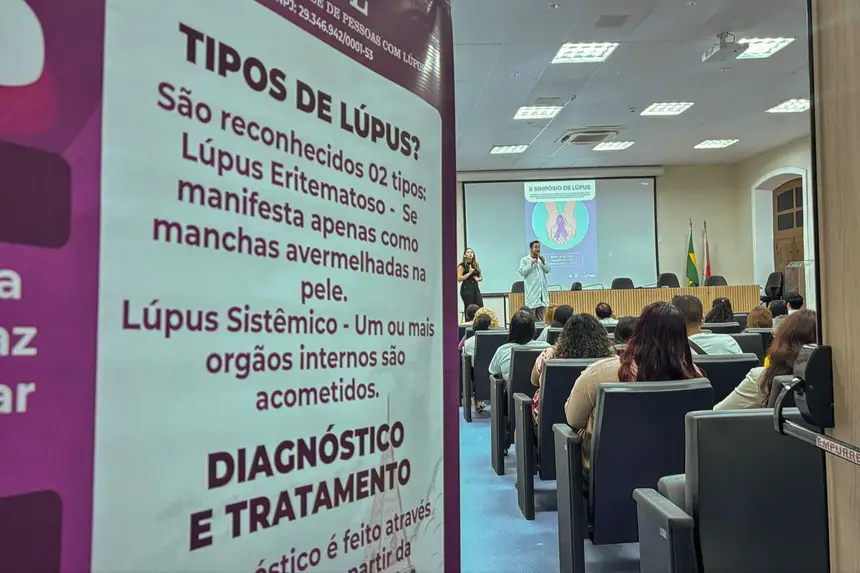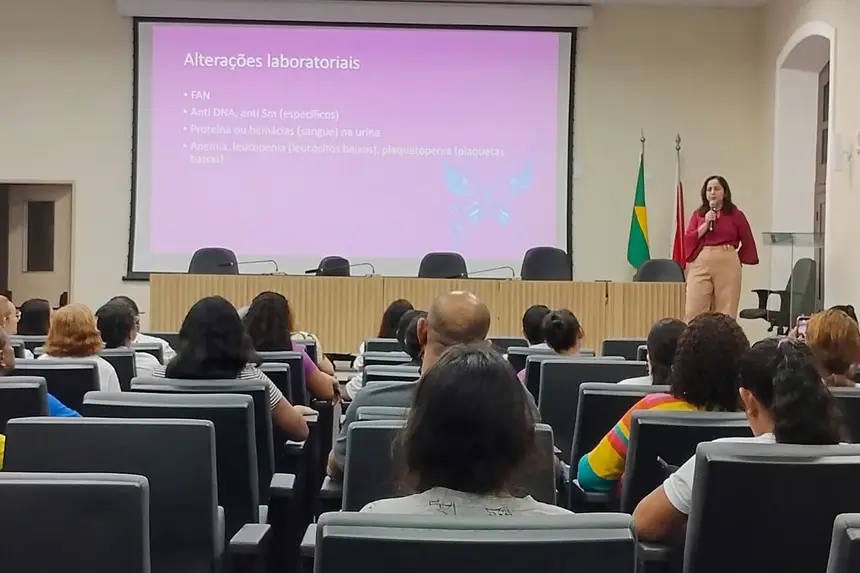Santa Casa holds II Lupus Symposium in partnership with the Pará Association of Disease Carriers
Event brings society closer to the institution that serves patients in the area of rheumatology and provides guidance on the disease
The event, which took place this Wednesday (28), is a partnership between the Santa Casa Foundation of Pará and the Pará Association of People with Lupus and aims to promote awareness about lupus among patients, families, professionals, and students through multidisciplinary support, as well as provide updated and evidence-based information.
José Júnior Silva, a representative of the board of the Association of People with Lupus, explains that with the increase in patients receiving treatment for the disease, it has become important to strengthen the Association, which started in the municipality of Castanhal, in the northeast of the state. "And thinking about the struggle of all of us, lupus carriers, this event is strengthened with the support of the Santa Casa Foundation, which opened its doors to help us with awareness, in addition to diagnosis, which many people are unaware of."
"I think this symposium is already on the official calendar of Santa Casa, which we should hold every year. For us patients as a whole, it is very enriching because it clears up many doubts regarding the diagnosis. And this event came to add quality of life for all patients because you start to learn different things related to treatment that you had never seen before," highlights José Silva.
For rheumatologist Dr. André Ozela, one of the speakers at the event, autoimmune diseases are very neglected. "It is a number of a population that is proportionally small, but when we add all autoimmune diseases, it becomes a large number. And lupus is a disease that lasts a lifetime, so every year that passes, this number increases. So I think the first step for us to diagnose is to suspect that it exists. And for me to suspect, I have to know that it exists."
"And holding an event about a disease that is very important opens a space for the population to learn about it and, with that, learn to seek help. And for those who already have the disease, events of this nature contribute to the exchange of information. And one of the main premises is not to stop taking medication on your own. This is the main one, which we see especially in adolescents, in young adults, who sometimes rebel against the disease and give up everything. And the advice for treatment is not to give up, take the medication on time, and try to live. It is obvious that we talk about normality, but live as normally as possible," points out the rheumatologist.
According to the Ministry of Health, Systemic Lupus Erythematosus (SLE) is a rare chronic inflammatory disease that primarily affects young women. It is characterized by affecting multiple organs and presenting alterations in the immune response, with the presence of antibodies directed against the body's own proteins. Although the cause of SLE is not known, specialists believe that the interaction of genetic, hormonal, and environmental factors influences the onset of the disease. Knowing the symptoms and seeking medical help to diagnose the disease as soon as possible is essential to prevent worsening.
Erica Cavalcante, director of Teaching, Research, and Extension at the Santa Casa Foundation, and one of the speakers at the Symposium, says that lupus is a model of autoimmune disease. "If we take lupus as an example, a model, we can discuss autoimmunity, which is the basis of rheumatological diseases. The incidence is higher in women, at a ratio of nine women to one adult man; and in children, eight girls to two boys."
"Regarding care, we have several types of treatments, including through medications. Patients who may present severe kidney involvement also have access to hemodialysis and kidney transplantation. So today we have a wide range of treatments. And we can already envision a better quality of life for these patients, a longer lifespan due to treatments, due to the advances in today's treatment," clarifies the director, who is a pediatric rheumatologist.
According to the Ministry of Health Portal, lupus can manifest in four different forms, which have distinct causes. The main forms of the disease are:
Discoid Lupus: this type of lupus is limited to the person's skin. It can be identified by the appearance of reddish lesions with specific sizes, shapes, and colors on the skin, especially on the face, neck, and/or scalp.
Systemic Lupus: this type of lupus is the most common and can be mild or severe, depending on each situation. In this form of the disease, inflammation occurs throughout the person's body, affecting several organs or systems, in addition to the skin, such as kidneys, heart, lungs, blood, and joints. Some people with discoid lupus may eventually progress to systemic lupus.
Drug-induced Lupus: this form of lupus is also common and occurs because substances from some drugs and/or medications can cause inflammation with symptoms similar to systemic lupus. However, in this case, the disease tends to disappear as soon as the use of the substance ends.
Neonatal Lupus: this type of lupus is quite rare and affects newborn children of women who have lupus. Normally, at birth, the child may have skin rashes, liver problems, or low blood cell counts, but these symptoms tend to disappear naturally after a few months.













